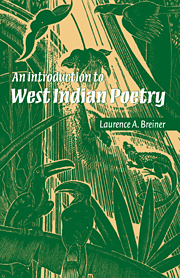Book contents
- Frontmatter
- Contents
- Preface
- Chronology for Anglophone Caribbean poetry
- Map of the Caribbean
- 1 West Indian poetry and its audience
- 2 The Caribbean neighborhood
- 3 Overview of West Indian literary histories
- 4 The relation to “Europe”
- 5 The relation to “Africa”
- 6 The relation to “America”
- Notes
- Guide to further reading
- Index
1 - West Indian poetry and its audience
Published online by Cambridge University Press: 06 January 2010
- Frontmatter
- Contents
- Preface
- Chronology for Anglophone Caribbean poetry
- Map of the Caribbean
- 1 West Indian poetry and its audience
- 2 The Caribbean neighborhood
- 3 Overview of West Indian literary histories
- 4 The relation to “Europe”
- 5 The relation to “Africa”
- 6 The relation to “America”
- Notes
- Guide to further reading
- Index
Summary
In 1971, the Conference of the Association for Commonwealth Literature and Language Studies (ACLALS) provided the occasion for a galvanic West Indian event. The main theme of the conference was West Indian literature, “the enactment of national identity in poetry, fiction, and criticism.” The setting, however, was shifted from the usual British university to the University of the West Indies (UWI) in Jamaica. As a result, this international academic forum (to the confusion of many of its delegates) served as the stage for a sort of private conversation, though it was as public and histrionic as most West Indian private conversation. What the delegates witnessed was a surprisingly literal “enactment of national identity.”
The lines were drawn up at the opening session. The panel that took up “The Function of the Writer in Society” included the most antithetical figures in West Indian literature at the time: the Barbadian poet and historian Edward (now Kamau) Brathwaite, then recently returned to the region after several years in West Africa, and V. S. Naipaul, the East Indian West Indian turned Englishman, soon to be the most renowned West Indian novelist, and happy to have escaped to the metropolitan capital. Brathwaite's keynote address rephrased the topic as a question: how does the writer develop a new sense of community for a multi-directional culture with a history of slavery, colonialism, and uncertain independence? He argued that the integrating principle must be sought in the submerged continuity of the “Little Tradition,” the culture of ordinary people.
- Type
- Chapter
- Information
- An Introduction to West Indian Poetry , pp. 1 - 24Publisher: Cambridge University PressPrint publication year: 1998



